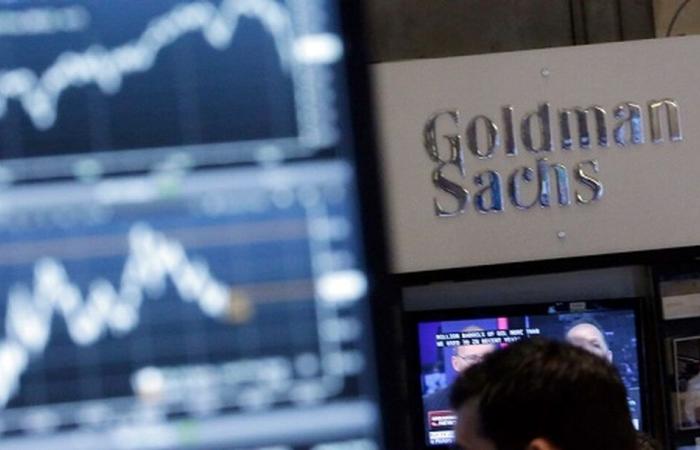(BFM Bourse) – The first winners and losers of Donald Trump's second term are emerging on Wall Street. Renewable energy groups are falling, due to a risk of unraveling of the IRA. Banks are buoyed by the prospect of deregulation of the sector.
Now that Donald Trump's victory in the US presidential election is established, the market is starting to identify the losers and winners of his second term in the White House, which will begin in January.
The most obvious winner (so far) is…. Trump Media & Technology Group (TMTG). This company oversees the businessman's “Truth Social” social network and jumped 30% in pre-opening on Wall Street. The title had already soared in anticipation of a victory for the Republican candidate in recent weeks. The fundamentals of this company (ultra-low revenues for large losses) are completely disconnected from its market capitalization of $6.8 billion. But investors were able to buy the stock, as a form of support for Donald Trump.
They were also able to hope that the Republican's accession to the White House would benefit the activity of Truth Social, with Donald Trump using his network as a megaphone. But nothing is less certain, given that one of Donald Trump's great allies, Elon Musk, is today the owner of X, a direct competitor to Truth Social…
Beyond this very particular case here are the sectors which are propelled on Wall Street by the victory of the businessman and those which, on the contrary, suffer.
Note: All prices in this article refer to pre-opening prices on the US market.
>> Access our exclusive graphic analyses, and gain insight into the Trading Portfolio
Oil, banks and autos jump
Towards deregulation for banks?
US bank stocks are taking off. JPMorgan takes 6.6%, Goldman Sachs jumps 7.5%, Bank of America climbs 7.7%, Morgan Stanley rises 7% and Citigroup 7.8%.
This nice group shot can be due to several factors. First, American banks, like all the stocks mentioned in this article (except TMTG) will benefit from the reduction in corporate tax desired by Donald Trump, to 15% compared to 21% currently. Then, the market can count on more robust growth under the Republican mandate, via stimulus measures.
Above all, investors anticipate a loosening of the regulatory grip. In April, Reuters reported that the businessman planned to reduce “the regulatory burden” and that he was concerned about “disastrous bank regulation under Biden,” citing people who spoke with him.
“For the US financial sector, we believe that Trump's victory is likely to be seen as an immediate positive, as it could presage deregulation,” UBS wrote on Wednesday.
“Drill, baby, drill”
Another sector is clearly progressing: oil and oil services groups. ExxonMobil gained 2.6%, Chevron 3.1% and Halliburton 6.6%.
Donald Trump has promised to halve the price of fuel at the pump in the twelve months following the election, and to make the United States the “dominant” energy producer in the world. Which would result in more drilling for black gold (with the famous “drill, baby, drill”). Remember that a little less than two-thirds of American oil production goes through shale oil and therefore through hydraulic fracturing.
The candidate could also end the Biden administration's moratorium blocking new liquefied natural gas (LNG) exports.
What to wear, theoretically hydrocarbon producers and companies offering associated services.
“Donald Trump's support for fossil fuel industries could benefit oil and gas stocks, as he will likely pursue policies that favor domestic energy production,” Daniela Hathorn, senior market analyst at Capital.com, was quoted as saying. by Reuters.
“If the American oil industry views Donald Trump's energy policies favorably, professional groups in the oil industry opposed Donald Trump's proposed tariff increases throughout his campaign,” nuance however S&P Global.
The car with less electrical voltage
Automobiles, or more precisely traditional automobile manufacturers, are also climbing. General Motors and Ford each gain around 2.5%. These values may be driven by positive market sentiment due to Donald Trump's desire to ease off electric vehicles, potentially with reductions or the removal of tax incentives.
However, this type of engine causes heavy losses to American manufacturers. General Motors warned when publishing its quarterly results that it had not yet achieved profitability. Ford, for its part, had suffered a heavy operational loss in its division specializing in electricity in 2023, of 4.7 billion dollars and revised downwards, in August, its ambitions in this area.
In a register that is sinister to say the least, prison operators GEO Group and Corecivic jumped 28% and 21%. These groups may benefit from promises “to crackdown on illegal immigration and restrictions on legal immigration, which could increase demand for detention centers,” notes Reuters.
Renewables and electricity are the big losers (but not Tesla)
Unlike hydrocarbons, renewable energy producers are suffering. Donald Trump has never hidden his lack of attraction for renewable energies and the market fears that he will unravel the inflation reduction act (IRA), a text which grants preferential treatment to carbon-free energies, or at least that he take policies curbing the expansion of non-fossil fuels. Donald Trump also announced that he wanted to wipe “offshore” (at sea) wind projects off the map if he was elected, noted Oddo BHF at the beginning of October.
“In the utilities sector, renewable energy-funded companies may face headwinds following Trump's victory. However, we expect demand for renewable energy to remain strong as companies, States and municipalities are focusing on decarbonization objectives,” UBS nuance.
The solar panel company First Solar fell 14.3% on Wall Street, and the solar energy specialist Sunnova fell 22.7%. Note that the Danish Orsted and Vestas, two wind power heavyweights, are losing more than 10% each.
Car manufacturers specializing in electric vehicles are moving backwards. Rivian lost 2.3% and the Vietnamese Vinfast lost 1.6%. But on the contrary, Tesla jumped 13%.
“We believe that a Trump presidency would be negative overall for the electric vehicle industry, as it is likely that rebates/tax incentives for this type of engine will be removed,” explains Dan Ives, analyst at Wedbush.
“But for Tesla, we see this as a huge positive. Tesla has unmatched scale and reach in the electric vehicle industry and this dynamic could give Musk and Tesla a clear competitive advantage in a vehicle subsidy-free environment. electric vehicles, coupled with likely higher Chinese tariffs that would continue to push out cheaper Chinese EV players (BYD, Nio, etc.) from flooding the US market in the years to come,” he continues.
Tech in disarray
The major tech groups are experiencing fairly disparate developments this Wednesday. Apple takes 0.3%, Nvidia 1%, Microsoft 1.5% Amazon is stable (+0.1%), Meta falls by 0.8% and Alphabet takes 2.2%.
Tech groups will also benefit from the tax cuts promised by Trump, if they are implemented.
But the Republican's expansionary policy is seen as inflationary, which pushes rates up. Mechanically, this weighs on growth stocks like tech.
“The big concern among many global tech investors we speak with is the implications of a Trump victory in the US presidential election for the US-China Cold Tech War and rising tariffs. “, explains Dan Ives. “We believe a major change in tariffs and a tougher stance on China would have a significant impact on the supply chain, on Nvidia, on Beijing's retaliation on Apple/Tesla, and slow the pace of the AI revolution,” he adds.
“In the technology sector, Trump's victory could spark increased fears about the impact of tariffs on the profits of hardware and semiconductor companies. But we don't think it will prevail on structural growth in the medium term”, judges UBS for its part. “AI infrastructure spending remains robust as businesses experiment with AI use cases and companies strive to occupy leading positions,” adds the Swiss bank.
Julien Marion – ©2024 BFM Bourse






